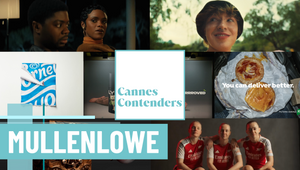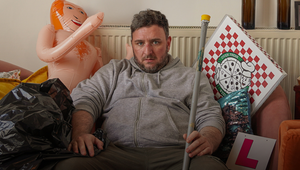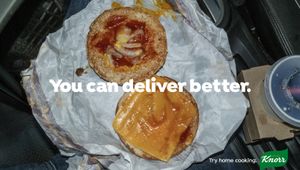
José Miguel Sokoloff: “Creativity Is an Act of Optimism”

José Miguel Sokoloff is feeling optimistic. But that’s not anything out of the ordinary. As a creative leader, that’s his default. “Creativity is an act of optimism,” he asserts. “It is a way of saying, whatever we're doing wrong, it probably can be done better, we can probably find a solution.”
So advertising as a creative discipline should be defined by hope and progress, not fear or decline, says the president and chief creative officer at Team Unilever at IPG, and MullenLowe’s global creative council president. “If you start by saying, this is a problem we're never going to solve, there is no solution for it, then nothing happens… Those of us who come from the creative side, we're basically born optimists. And I think we need to celebrate that. The more pessimists we bring into the business, the more it drags us down.”
Pessimism has crept into the industry, ventures José Miguel, amplified by anxiety about AI, shrinking budgets, and existential doom narratives. He sees it at Cannes Lions every year recently. “We go there. We say how everything is fucked, how there's nothing we can do, how AI is going to take our jobs, and how the budgets are getting smaller, how everything is imploding,” says José Miguel. “And you look at our actions, and our actions are 100% ‘We believe we can win. This will be great.’ I think we need to be a little bit more coherent.”
The culture of pessimism drags the business down and misrepresents the energy that actually fuels it.
And yet, we see tens of thousands of entries submitted to Cannes Lions every year – an expression of widespread optimism. “If you want tangible optimism – so much gets entered that people think is going to win,” says José Miguel. Our rhetoric needs to match our behaviour: if we truly believe in the work, we must act and speak with coherence and confidence.
His own group of agencies - MullenLowe - came back from the festival this year with a return on their optimism. Work for Axe, Cornetto, Magnum, Alkem Laboratories and Persil brought back Lions for the agency.
Even developments that might seem negative hold optimism for the MullenLowe creative council president. “I think another good thing about this moment in our industry is that we are going through such dramatic times that I think most of the pessimists have already probably gone. When you say there's voluntary redundancy, they're the first to raise their hand. So this is a bit of pruning of the industry.”
Therefore, those who remain are more likely to believe in the future and be motivated to build it. “The people who believe in where you're going should continue to be the engine.”
Because of this, we now have an opportunity to reset the tone and re-anchor the business around optimism. But making that tangible is complicated, says José Miguel. “It's culture. I don't think you can operationalise it. The way you work together, the way you hire, the way you celebrate success, the way you learn from failure. What doesn't kill you only makes you stronger – always think like that. And I think it's an attitude. And I think that's why we're excited about this.”
But optimism on its own is not enough; it must be paired with hard work and purpose to create real results. “There's a lot of research that proves that people with a positive attitude are more successful. Now, this whole bullshit about manifesting,” he laughs – “that, in essence, is optimism.” Therefore, cultivating a culture of belief and resilience is critical for long-term industry health.
Generative AI is, depending on your outlook, a source of optimism or pessimism. But true creative greatness is still unbothered by it, as José Miguel sees things. “Now everybody really understands that AI gets you from zero to seven. But it won’t get you above a seven.” Someone recently suggested to him that AI stands for “average of the internet.” So it can get you there, “which is really good,” he says, “because you don’t have to deal with the shit, awful advertising that some people used to do. The baseline is at least a lot higher. But eights, nines and tens are always going to win.
And if companies try to use AI to remove humans from every part of the process while claiming to serve humanity, they will be exposed and punished. “Do you believe that you want to make the lives of humans better? Then act accordingly,” says José Miguel. “But if you're going to remove humans from the equation when it comes to making the product, designing the product, marketing the product, and say ‘humans are a pain in the ass, they're only good if they buy’ – people are going to see right through that and punish you hard.”
Because the truth is, brands that truly want to make people’s lives better must centre humanity, not efficiency.
There’s a persistent myth that advertising is becoming too cheap to be profitable. But José Miguel argues that mediocrity – not transformation – is the real barrier to making money. “I think it's impossible to make money in any business if you're mediocre. But if you're good, you can always make money. So let's concentrate on being good and not worry about that.”
The Decline of Scam Work
One tangible reason for the MullenLowe creative chief’s optimism is that awards shows like Cannes Lions have become more discerning – no longer rewarding scam work as readily. “I think we've gotten really, really smart at Cannes. Cannes has gotten progressively a lot smarter, Jurors have gotten a lot smarter at not awarding bullshit scam work. And that gives me a lot of hope. That makes me very optimistic. Because if we want our industry to survive and have credibility, it needs to be a serious industry.
“We were sending the completely wrong message to clients,” he continues. “In the most extreme cases: ‘If you want really good work, I’ll do it for free – but if you want mediocre work, then you have to pay me.’ “And I’m happy that’s going away. The industry is sending a clearer message to clients about what constitutes credible, effective creativity.”
Brand Building Is Back
As the person leading creative globally for Unilever, one of the world’s biggest clients, José Miguel sees how important long-term brand building really is to advertisers these days. “I think that the sales pressure, performance pressure with The Growth Action Plan they have, [I can see] how much of the limelight is on results. That has caught those that spent a lot of their time in the past three or four years not worrying about the brand really off guard. They’re trying to catch up. And it's going to be hard. But it has started a conversation, which is good – which is: we need to permanently take care of our brand, and put it out there, and make it familiar to people, and make it relevant to people. That is something I think we had to fight a lot harder for. And now – at least within my universe –it’s something I don't even have to mention anymore. It's a given. And I think that makes me optimistic, because it is what we do.”
Trade Wars Might Not Be All Bad
While Donald Trump puts up barriers to trade and geopolitical friction challenges globalised brands, José Miguel finds another cause for hope. Because when global players step back, space opens up for culturally rooted businesses to create meaningful and competitive work.
He goes back to his past in Colombia, which was at war for decades while he was growing up and starting his career. “It was probably one of the last places you would put a Louis Vuitton store, right? Because rich Colombians would buy LVMH when they went to Miami or New York. When the country started getting normalised, I’d say the 2010s – our high streets were a joy, because you didn’t have the copy-paste high street that we have everywhere these days. They had luxury items that were things we had created – that were very Colombian. Over time, these big brands have kind of made their way in. But still, in the Colombian mind, our brands are worth something. So they’re there side by side.”
He fast forwards to the tariffs of 2025. “I believe that as these walls start to be built, there is a fabulous opportunity for local businesses to build their reputation. And that’s a beautiful territory for brand creation, for advertising, for unique things. And I would love to participate in that. It’s going to be very cool.”
As a thought experiment, he imagines if IKEA furniture were to become prohibitively expensive to import. “If you have a British furniture company, you're going to have British furniture that is like IKEA. Because we already have the know-how. But it's going to be more British and less Scandinavian. That's cool. I'm up for that.” For an industry that’s interested in building new brands, that’s fertile ground.
In a moment when pessimism feels like the default mode in advertising, José Miguel makes a compelling case for optimism – not as naïveté, but as a creative and commercial necessity. He argues that belief, culture, and quality still drive effectiveness, and that industry transformation, if approached with resilience and purpose, offers more opportunity than threat. From the resurgence of brand-building to the rise of local creativity in a fractured global market, his message is clear: the future still belongs to those who build it with conviction.















